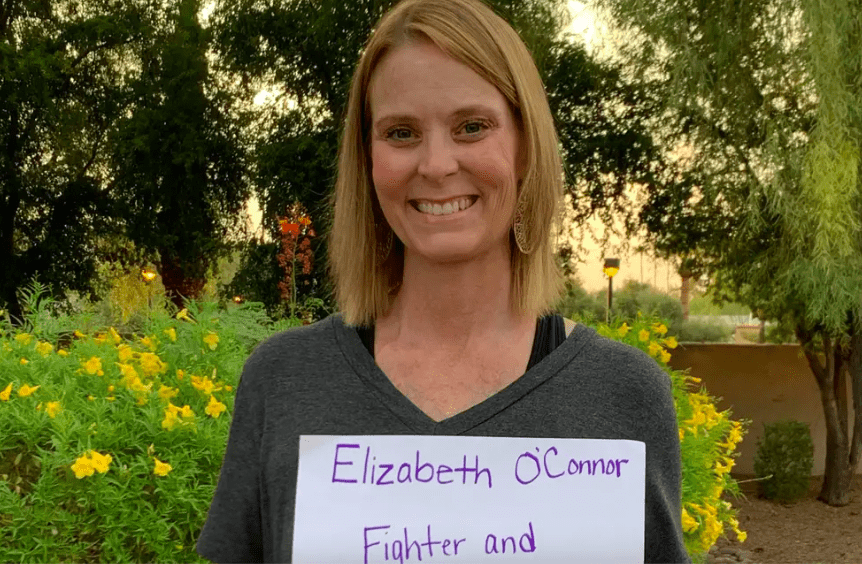Trending Stories
The Inspiring Tale of a Mother’s 13-Year Battle with Stage 4 Pancreatic Cancer

Triumphing Over Terminal Illness: The Inspiring Tale of a Mother’s 13-Year Battle with Stage 4 Pancreatic Cancer
Soon after embracing the joy of motherhood, Elizabeth O’Connor faced the unthinkable – a diagnosis of Stage 4 pancreatic cancer.
Fast-forward 13 years, and she’s an incredible survivor, living proof of the progress in cancer research and treatment. Her compelling journey unveils hope amid daunting odds.
Elizabeth O’Connor: The Fearless Fighter
Upon the birth of her son, Elizabeth O’Connor’s life took a turn. A diagnosis of stage 4 pancreatic cancer loomed over her, casting a dark shadow on what should have been one of the happiest times in her life.
While most pancreatic cancer patients do not live beyond a year post-diagnosis, O’Connor, diagnosed at 31, is now 44, confounding statistics and creating hope for others in her shoes.
Unraveling the Diagnosis
O’Connor’s journey into the whirlwind world of cancer began during her pregnancy when she experienced unusual tiredness and constant nausea.
An ultrasound scan revealed significant cysts on her ovaries, initially thought unrelated to cancer. Following the premature birth of her son, Andrew, further investigations led to a chilling revelation – a tumor on her pancreas, metastasized to her ovaries and hip bone, declaring her a stage 4 pancreatic cancer patient.
Resilience in the Face of Recurrence
Despite initial fears, O’Connor chose not to surrender to the bleak prognosis. Instead, she embarked on her battle with cancer with targeted chemotherapy, which successfully shrank the tumor enough to proceed with radiation and surgery.
Her response to treatment was laudable, positioning her as an exception among pancreatic cancer patients.
Unfortunately, cancer had more surprises in store for her. Recurrences cropped up, first in her brain and later in various locations. Each time, she chose to confront the challenge, seeking treatments across states from North Carolina to Wisconsin and Arizona.
Overcoming Obstacles: Hope in Immunotherapy
2020 marked a challenging year when the cancer returned to her brain. This time, the tumor’s positioning made surgery impossible. However, O’Connor found hope in immunotherapy developed by researchers funded by Stand Up To Cancer.
Miraculously, the treatment worked, the tumor shrunk, and her energy returned, allowing her to engage in daily activities and enjoy precious moments with her family.
Conclusion:
A Beacon of Stability Amid the Storm
O’Connor’s story of resilience shines like a beacon for others facing similar odds. Despite the hurdles thrown her way, she remains stable, her spirit unbroken, and her will to live unyielding.
Regular scans keep her health in check, and the words from her doctors, “We’re getting to the next best thing for you,” fuel her optimism for a brighter future.
It might not happen in her lifetime, but O’Connor is certain that a cure for cancer is within reach. Her survival story stands as a testament to the leaps of progress in cancer research and treatment, proving that even in the face of stage 4 pancreatic cancer, there is hope
Life Amid the Trials
As Elizabeth navigated her way through treatments, life outside the hospital continued. While grappling with the disease, she had to juggle the responsibilities of a mother and a wife.
Her daughter matured quickly, while her son, Andrew, demonstrated a worrisome nature. Despite the challenges, her husband, Patrick, stood by her steadfastly, providing the emotional support she needed.
Adversity: A Catalyst for Personal Growth
Elizabeth’s journey has been far from easy. The countless treatments, hospital visits, and bouts of sickness took a toll on her, both physically and emotionally.
But the obstacles she faced seemed to have fueled her determination to fight even harder. Her doctors noted her steady condition, often using the term “stable” – a word that, in the context of cancer, translates to optimism and victory.
A Ray of Sunshine in Dark Times
As the sun shines after a storm, Elizabeth found her silver lining amid the darkness. Today, she revels in the joy of life’s simple pleasures – being able to cook, do the laundry, and take Andrew to baseball practice.
These moments, which may seem mundane to some, are significant milestones in her journey of survival.
Inspiring Others in the Fight Against Cancer
Elizabeth’s journey is not just her own; it serves as an emblem of courage, resilience, and hope for those facing a similar battle.
Her belief in the possibility of a cure, backed by her remarkable survival, offers a glimmer of hope to many. It shines a spotlight on the tremendous strides made in the realm of cancer research and treatment.
Afterword: A Tale of Unyielding Spirit
Elizabeth O’Connor’s incredible survival story is a testament to the resilience of the human spirit and the progress of medical science.
It underscores the importance of cancer research organizations such as Stand Up To Cancer. Her experience demonstrates that even in the face of daunting odds, there’s room for hope, strength, and the will to keep fighting.
source :
Trending Stories
Can Supplements Fix Belly Fat? Experts Weigh in on the “Cortisol Pouch” Myth
Trending Stories
Sister Regina Liu: Empowering Health Through Acupuncture

Sister Regina Liu: Empowering Health Through Acupuncture
In the bustling world of healthcare, Sister Regina Liu stands out as a beacon of holistic healing. Her journey into the world of acupuncture is not only inspiring but also transformative for the countless individuals she has treated.
Through her dedication, Sister Regina has brought traditional Chinese medicine to the forefront, offering an alternative and complementary approach to modern medical practices.
The Journey of Sister Regina Liu
Sister Regina Liu’s path to becoming a renowned acupuncturist began with her deep-rooted interest in holistic health. Born into a family that valued traditional Chinese medicine, Sister Regina was exposed to the benefits of acupuncture from a young age. Her early fascination turned into a lifelong passion as she pursued formal education and training in the field.
Acupuncture: Bridging Ancient Wisdom and Modern Health
Acupuncture, a practice with origins in ancient China, involves inserting thin needles into specific points on the body to balance the flow of energy or “qi.” Sister Regina Liu has mastered this ancient art, using it to address a wide range of health issues.
From chronic pain to stress management, her expertise has provided relief to many who had exhausted conventional treatment options.
Impact on Community Health
Sister Regina’s impact extends beyond individual treatments. She has been instrumental in educating the community about the benefits of acupuncture, breaking down misconceptions, and making the practice more accessible.
Her workshops and seminars have enlightened many about the holistic approach to health, emphasizing the interconnectedness of body, mind, and spirit.
Success Stories and Testimonials
The success stories of Sister Regina’s patients are a testament to her skill and dedication. Many individuals who had lost hope found solace in her treatments.
For instance, Maria, a long-time sufferer of migraines, experienced significant relief after just a few sessions with Sister Regina. Her story is just one of many that highlight the transformative power of acupuncture under Sister Regina’s care.
Challenges and Triumphs
Like any journey, Sister Regina’s path was not without challenges. Integrating acupuncture into mainstream healthcare faced resistance initially.
However, her perseverance and the undeniable results of her treatments gradually won over skeptics. Today, Sister Regina is not only respected in the field of acupuncture but also in the broader medical community.
The Science Behind Acupuncture
While acupuncture is rooted in ancient practices, modern science has begun to unravel the mechanisms behind its effectiveness. Studies have shown that acupuncture can stimulate the release of endorphins, the body’s natural painkillers, and improve blood circulation.
These scientific validations have further cemented acupuncture’s place in contemporary healthcare, thanks in part to advocates like Sister Regina Liu.
Acupuncture in Modern Healthcare
Sister Regina’s work exemplifies how traditional practices can complement modern medicine. Hospitals and clinics increasingly incorporate acupuncture into their treatment plans, recognizing its benefits in pain management, mental health, and overall well-being. This integration signifies a broader acceptance and understanding of holistic health practices.
Future Vision
Looking ahead, Sister Regina Liu envisions a future where acupuncture and traditional Chinese medicine are fully integrated into the global healthcare system. She continues to advocate for research, education, and policy changes that support the inclusion of holistic practices in mainstream medicine.
How to Get Started with Acupuncture
For those new to acupuncture, Sister Regina offers practical advice on getting started. She recommends finding a certified acupuncturist, understanding the treatment process, and maintaining an open mind. Her guidance helps demystify acupuncture, making it more approachable for newcomers.
Conclusion
Sister Regina Liu’s journey in empowering health through acupuncture is a remarkable tale of dedication, resilience, and success. Her contributions have not only alleviated individual suffering but also enriched the broader understanding of holistic health. As acupuncture continues to gain recognition, Sister Regina’s legacy will undoubtedly inspire future generations of healers.
FAQs
1. What conditions can acupuncture treat?
Acupuncture can address various conditions, including chronic pain, migraines, stress, anxiety, digestive issues, and more. It is also used to support overall wellness and balance.
2. Is acupuncture safe?
Yes, when performed by a certified and experienced acupuncturist, acupuncture is safe. It involves using sterile, single-use needles and adhering to proper hygiene practices.
3. How many sessions are needed to see results?
The number of sessions varies depending on the condition and individual response. Some may experience relief after one session, while others may need multiple treatments.
4. Does acupuncture hurt?
Acupuncture needles are very thin, and most people feel minimal to no discomfort. Some may feel a slight tingling or warmth at the needle site.
5. How do I find a qualified acupuncturist?
Look for acupuncturists who are certified by recognized professional organizations and have positive patient reviews. Personal recommendations and consultations can also help in making an informed choice.
References
Trending Stories
In 2 Shape Gym Unveils Major Expansion in Stourport
-

 Trending Stories1 year ago
Trending Stories1 year agoCDC: 1 in 4 Americans Still COVID-Free by End of 2022
-

 Health5 years ago
Health5 years agoMeghan Trainor Shares Motivational New Song ‘Blink’
-

 Health6 months ago
Health6 months agoHow Do Pawpaw Seeds Support Cardiovascular Health?
-

 Health2 years ago
Health2 years agoHow Long Does Monkey Pox Last Before It Surfaces in the Body?
-

 Health3 years ago
Health3 years agoWhat Causes Swollen Body? Understanding Edema and its Triggers
-

 Health3 years ago
Health3 years agoNutrition and the Importance of a Fitness Program – 3 Things to Know
-

 Health3 years ago
Health3 years ago5 Weird Reasons Why Pimples Disappear After Marriage
-

 Health2 years ago
Health2 years agoHealth Benefits Of Pawpaw Seed? 7 Things To Know







